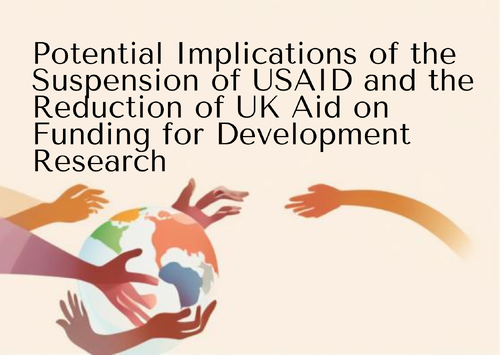
Small country, big agenda.
Dramatic aid cuts in the USA and UK – which will cost millions of lives 1 - may finally get the international development community to focus on two key questions. First: What should the post ODA2 architecture look like? Second, what is Ireland’s role in trying to get there?
It is interesting to remind ourselves of the fact that the OECD (which defines and counts ODA), was originally the OEEC - the Organisation of European Economic Cooperation. It was set up to administer the post war Marshall Plan to Europe. When finite Marshall Aid for reconstruction and development came to an end, the OEEC became the OECD, with the addition of Development to signal a commitment to extend assistance to the global south.3 Since then, development rhetoric has often been about “doing ourselves out of a job”. But aid related institutions have proliferated. In the early 1960s there were less than 500 European NGOs active in international development. By the early 1990s there were just short of 2500.4
But the aid regime – and thinking within it – has been slow to evolve. Over 20 years ago, Inge Kaul was arguing that Global Public Goods could underpin International Cooperation and help manage globalisation.5 But Financing for Development meetings have come and gone, the Global Partnership for Effective Development Cooperation has talked for 20 years.6 And yet there has been little political engagement – let alone action – on how essential international cooperation on global challenges should be financed and managed. It’s a devilishly tricky question – but that’s no excuse for lack of thinking and analysis – and leadership - on the options.
So, let’s suppose that the recent savage aid cuts in the US and UK signal that the implosion of development aid has begun. We are at the start of the end of aid – except maybe for emergency humanitarian assistance.7 What potential is there for the Irish development community (governmental, academic and NGO) to engage with - and help shape - international thinking on a global public goods architecture to replace aid? What issues might Ireland focus on within this broad – but essential - agenda.
The first thing to say, is that Ireland has transformed its social and economic image internationally. Many partners are interested in learning from Ireland’s progress. This, plus Ireland’s experience of poverty, famine, colonisation, migration and conflict – as well as our reputation on peacekeeping, multilateralism and human rights, can help Ireland frame a contribution which is both informed, unthreatening and innovative.
Second, within a necessarily wide agenda, Ireland’s focus should be clear. Ending malnutrition – the most acute manifestation of poverty – should be a first, and surely uncontroversial call on global public resources. This is something which must at the core of Ireland’s pitch at both the 4th International Conference on Financing for Development this summer 8, and in wider global discussions on ODA and global public goods which Ireland should be proactive in promoting.
Ireland’s contribution to a modern international narrative on addressing global challenges and how they should be financed would be strengthened by finally replacing the Irish Aid brand, with something which gets beyond the north-south, rich-poor, donor-recipient mindsets of the post war, postcolonial 20th century. For many ‘international development’ will never get beyond the idea of aid, charity and problems ‘over there’. Whilst charity per se is a good thing, international cooperation is a more appropriate framing, reflecting shared interests - on climate, peace and security, the economic benefits of greater equity.
Irish organisations and citizens (NGOs, missionaries, rock stars!) have made a huge contribution on ending poverty and hunger. Their achievements can best be built upon through a reimagined cooperation system, which underlines the shared nature of challenges. The SDGs were explicitly framed in terms of universality. Ireland’s voice will be more persuasive, if we link the need to address poverty and inequality at home as well as overseas. The need to address climate challenges in every country.
Coming back to food systems and the scourge of malnutrition, it is a good starting point for the Global Public Goods discussion because, whilst many public goods will require never ending effort, ending malnutrition is something which – like eliminating smallpox – can be realised. It’s a success that the public and politicians could get behind with a renewed sense of possibility.
Central to the new international cooperation architecture must be financing and regulating global, national and local food systems, which put people first. Adequate and affordable nutrition for all should not only be the acid test of an effective food system. It should also be a key benchmark against which sustainable returns to shareholders are judged.
Ireland is fortunate in its institutions and potential for thought leadership. ‘Small country, big agenda’ should encapsulate Ireland’s new approach. Falling aid, ‘beggar my neighbour’ trade policies and challenges to democracy are currently the depressing default narrative. Are we expecting the market and media to lead progressive thinking on climate, social justice, global governance? Have we NGOs and researchers focused too much on social dynamics at the
expense of some economic and political fundamentals which help cause and perpetuate poverty, inequality and indeed climate change in every country?
A young and globally aware generation of Irish citizens can be inspired to engagement and action - if the academic, NGO and political community offer some fresh and radical analysis, evidence and leadership on what post-aid financing, cooperation and institutions should look like.
Tony German helps coordinate the DSAI Climate and Development Study Group and is Co-Director of Ideas and Action for Public Good.